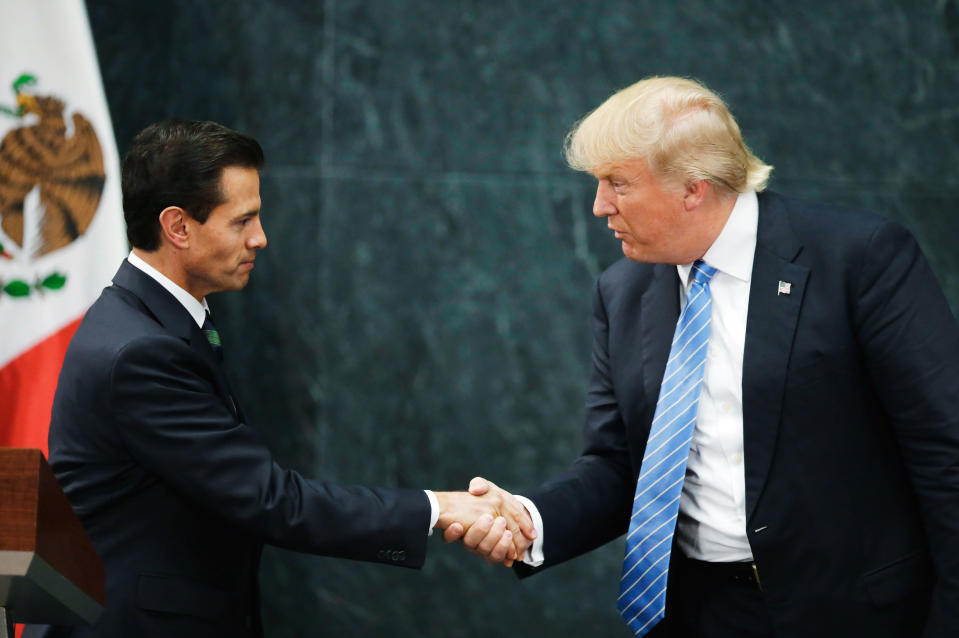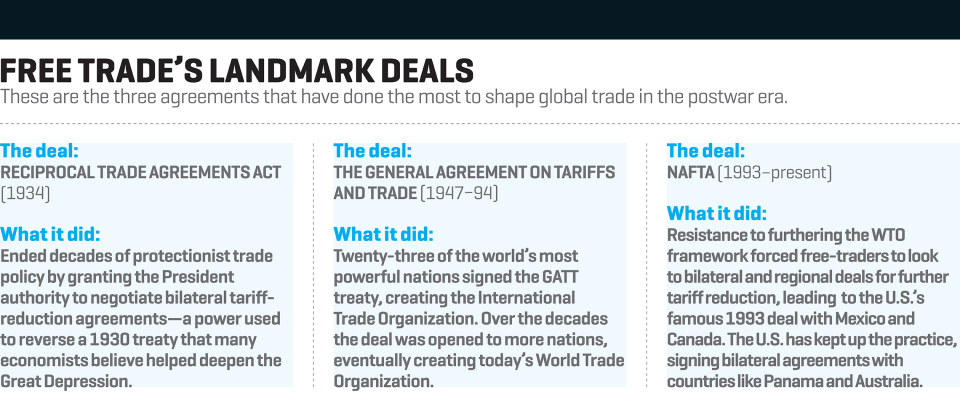Everything You Need to Know About Free Trade This Election Cycle
The Trans-Pacific Partnership is on life support, and as President Barack Obama readies a long-shot push to get the free-trade deal through Congress this fall, he may be virtually the last elected official in Washington who hasn’t given it up for dead.
Hillary Clinton-who once lauded the deal as the “gold standard” of trade agreements-has spent months trying to convince nervous progressives that she has no intention of supporting the 14-nation pact once she gets in office. (For more, see here.) And Donald Trump-the nominee of a Republican Party whose support of free trade was once more reliable than clockwork-has been calling the pact “a rape of our country.”
The agreement’s moribund condition is a far cry from where it was just last year, when it seemed that passing the TPP was the only thing Obama and congressional Republicans could agree on. Then Washington was rocked by the populist campaigns of Bernie Sanders and Donald Trump, which brought with them 20 years of pent-up anger over sagging wages, rising income inequality, and suspicions of corporate political cronyism.

Mexican President Enrique Peña Nieto met with Donald Trump, who has advocated tearing up the countries’ trade agreements.Photograph by Henry Romero - Reuters
The debates’ toxicity has most members of Congress hoping the issue will just go away, lest they be labeled traitors to the American worker. The problem with this interpretation of trade deals, however, is that there isn’t much evidence that it’s accurate. “Free-trade agreements have become a scapegoat for a lot of other forces changing the economy,” says Cathleen Cimino-Isaacs, a research fellow at the Peterson Institute for International Economics.
Indeed, when one ponders the changes that the global economy has had to digest over the past 25 years, from the fall of the Iron Curtain to the flowering of the Internet-based economy to the entrance of 1.3 billion Chinese into the labor force, it would be surprising if the effects weren’t felt by American workers. The government wasn’t responsible for most of these changes, of course, but votes on free-trade agreements are an easy target for blame.
The harshest criticisms of free trade, though, seem overblown once scrutinized. Sanders likes to cite a statistic from the labor-backed Economic Policy Institute that NAFTA cost the U.S. 700,000 jobs over 20 years. That sounds damningly high, but it adds up to just 35,000 jobs per year, or a seventh of the number of jobs the U.S. economy has gained on average per month this year. Even if these job-loss estimates are to be believed, the increased economic growth and trade flows that resulted from the deal mean that NAFTA likely counts as a net benefit for the American economy.
To be sure, the U.S.’s nearly century-long march toward freer trade has created losers as well as winners. In the six years following China’s 2001 accession to the World Trade Organization, the U.S. lost 6 million manufacturing jobs. A recent study argued that the precipitous drop was due in part to the U.S.’s agreement to make lower tariffs-which it had been temporarily approving on an annual basis-permanent as a result of China’s new WTO-membership status. But it’s impossible to say how long those jobs would have lasted had the tariffs remained, and whether China would have retaliated by closing off its markets had the U.S. resisted its WTO membership.

Most Americans recognize that protectionism is a losing hand, as evidenced by a recent Gallup poll showing that 58% of the nation sees foreign trade as an opportunity rather than a threat. It’s a vocal minority that is gumming up the works, just as it did 20 years ago when Bill Clinton fought to pass NAFTA. The deal eventually passed after he returned to Congress with fresh concessions from Mexico and Canada-a scenario many still hope could play out in a second Clinton administration with TPP.
But the political will for openness has never seemed so weak, despite the math. “We are 5% of the world’s population,” Clinton herself argued earlier this year. “We have to trade with the other 95%.” A Washington that is serious about stimulating growth at home and abroad will not stay away from the free-trade negotiating table for long.
A version of this article appears in the September 15, 2016 issue of Fortune with the headline “The Tide That Sinks All Boats.”
